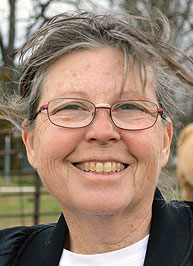
Karla Johnson greets most visitors with a smile, a wave and an invitation to meet her in her horse barn.
No matter the time of day or evening, you will find Karla working with her Fox Trotters on her 30-acre farm in Springfield, Mo. So the best way to snag a little quality time with Karla is to hang out with her while she tends to her horses.
“I have always loved horses. Ever since I was old enough to say anything about anything,” laughed Karla. Stepping into the pastures at KT Foxtrotters proves to be a treat. Karla’s horses carefully swarm visitors, nuzzling close, in hopes of getting their long faces petted or tall backs scratched.
“They like people. They like being around people,” said Karla of the dozens of Fox Trotters on her farm.
Karla spent many years working in Alaska as a drilling engineer for a company called Arco. In the late 1990s, Karla and her husband, Tommy, moved to the Springfield-area in order to be closer to Karla’s father. As soon as they moved to their farm, Karla bought two Missouri Fox Trotters. In the years since, Karla has built KT Foxtrotters into a sizable horse farm.
“It’s mostly a hobby that got out of control,” said Karla with a chuckle.
Her passion for horses actually dates back to when she joined a Girl Scout Mounted Troop in St. Louis, Mo., while in high school.
KT Foxtrotters owns eight Fox Trotter stallions. All of the stallions are registered and half are gold papered. When Karla started building her operation, she purchased the foundation bred Cremello stallion, White Knight, and foundation mares, including a granddaughter of the champion stallion Zane Grey. Through the years, she has grown her herd by focusing on several factors.
“I breed for disposition, conformation, and natural gait with color as a bonus,” explained Karla. KT Foxtrotters tries to keep its genetics close to the breed’s foundation horses.
“The Fox Trotter group for a while wanted small, slim, petite horses. I wanted to stay with the old-time breeding that was bred for working in the mountains and working cattle. Because I have been really selective in the bloodlines that I have kept, that is why I have ended up with the stock that I have,” Karla explained.
Horse enthusiasts come to KT Foxtrotters looking for a variety of horses.
“Most people nowadays are looking for trail horses, but I have horses that are great show prospects too,” said Karla. She takes pride in letting her customers know that her horses are natural gaited.
Occasionally, KT Foxtrotters studs out its stallions to other breeders. This year, KT Foxtrotters plans to take three of its stallions on the Missouri Fox Trotter Stallion Tour. According to the tour’s website, the tour will offers Fox Trotter stallion the opportunity to showcase their stallion to breeders and Missouri Fox Trotting Horse enthusiasts. Various venues will be offered with attendees being bussed between locations. Each stallion will receive a solo showcase opportunity where they may either be ridden or modeled while an announcer highlights the stallion’s pedigree and accomplishments.
Recently, KT Foxtrotters purchased an additional 33 acres of land near the farm. Karla says she needed more acreage for her herd of 50-plus horses.
“One-third of my herd is over 22-years old. I guess I just take too good of care of them,” commented Karla with a big grin.
Simply feeding such a large number of horses can be a challenge. But Karla has discovered a strategy that works well for all her Fox Trotters. She feeds a 32-percent protein feed to all her horses. Her lactating mares and active stallions receive 2 pounds a day. She supplements the high-protein feed with less expensive sweet feed and loose minerals.
“I have kept mares in good flesh that are feeding big foals,” said Karla.
This feeding plan allows Karla to make small modifications without customizing and mixing feed to meet the needs of each horse. Karla says the feed works well for her seniors down to her foals.
“It is really easy to make adjustments on a regular basis,” explained Karla.
Though the mild temperament drew Karla to the Fox Trotter breed, Karla also maintains working with her herd on a daily basis instills a calm, gentleness in her horses.
“Every time you interact with a horse, they are going to learn something. Good or bad, they are going to learn something,” said Karla.
She says she makes a conscious effort to ensure her interactions with her horses are positive. In addition, when the foals at KT Foxtrotters are 7 to 8 months old, Karla starts feeding them in the aisles of her barn. This allows the foals to get used to different noises, stimulus and other environmental factors.
Karla admits managing a large herd of horses requires a great amount of time and effort, but to this retired engineer, caring for her horses isn’t work at all. It’s fun.
“They are my passion and my every day life,” concluded Karla.







